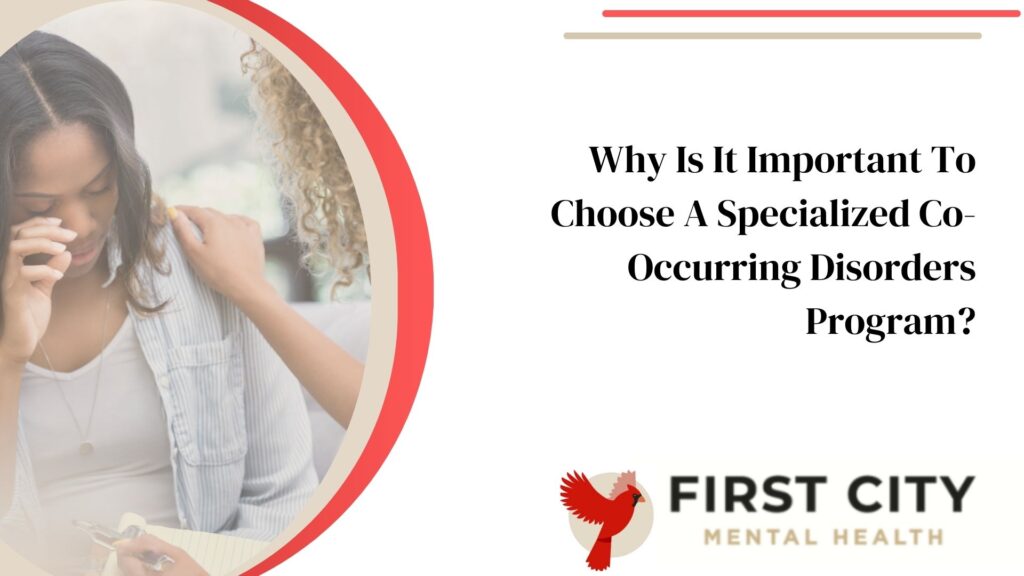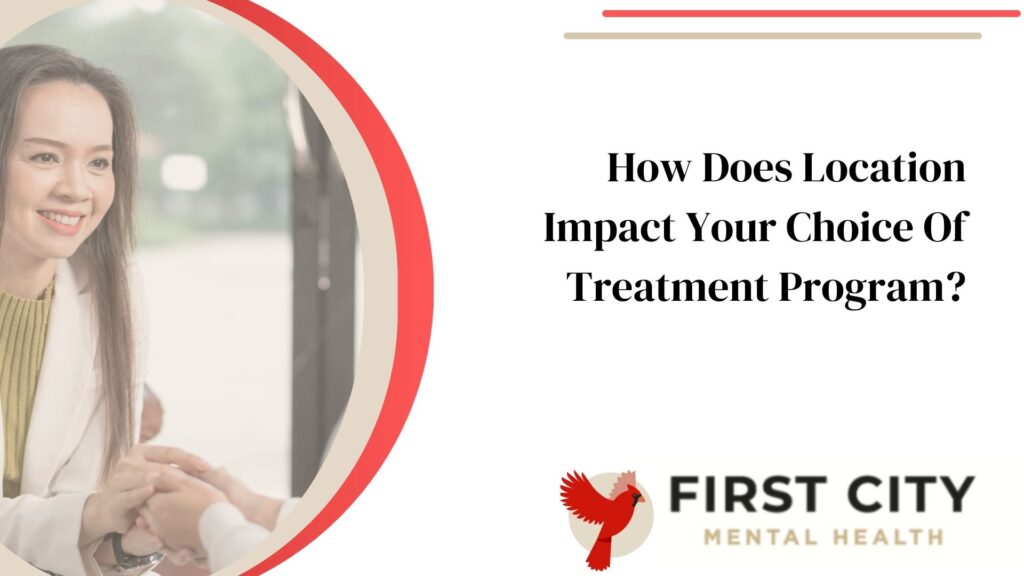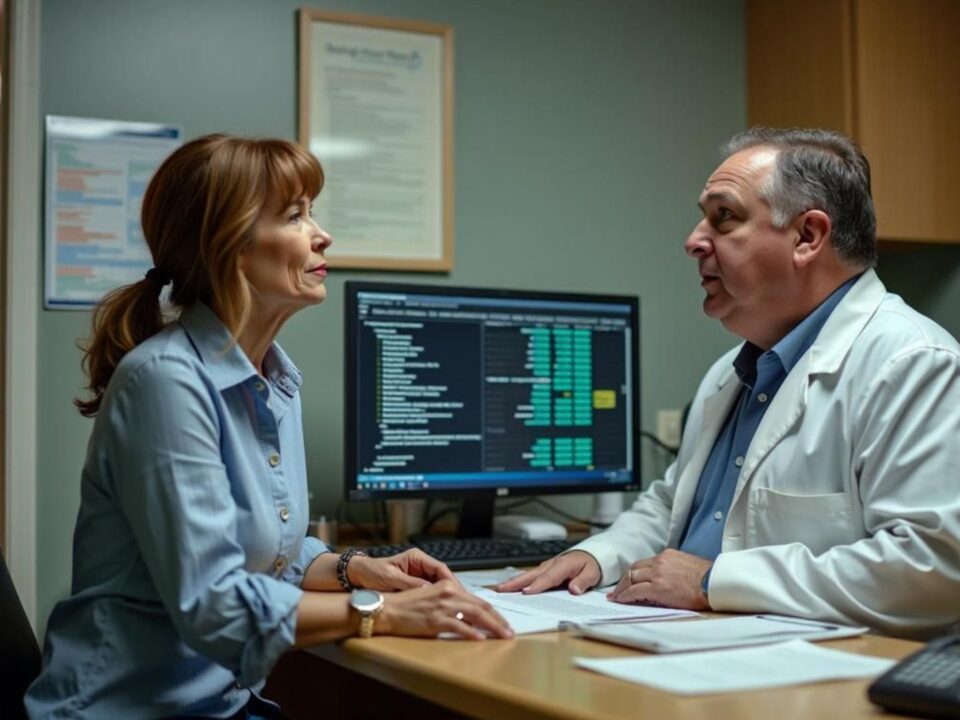
Why Are Relapses Common In Co-occurring Disorders Treatment?
January 21, 2025
What Are Co-Occurring Disorders and How Are They Treated?
January 21, 2025Choosing the right co-occurring disorders treatment can be challenging. Dealing with both a mental health disorder and a substance use disorder at the same time, often referred to as co-occurring mental disorders, adds to the complexity.
One key fact is that specialized treatment programs are often more effective than general ones. This article will guide you on what factors to consider, what questions to ask, and how to find reputable centers.
Follow these tips to make an informed choice.
Key Takeaways
- Choose a program that treats both mental health and substance use disorders together.
- Confirm staff have expertise in dealing with co-occurring disorders.
- Look for programs with various therapy options like counseling, medication, and support groups.
- Make sure the treatment fits your unique needs and is based on proven methods.
- Check if the center has good reviews and offers affordable care.
Understanding Co-Occurring Disorders
Definition and Meaning
Co-occurring disorders refer to the simultaneous presence of two or more disorders or illnesses in an individual. This term is often used to describe someone who has both a substance use disorder and another psychiatric illness. For instance, a person might struggle with both major depression and substance abuse.
Symptoms and Risk Factors
Symptoms of co-occurring disorders can be complex, as they often interact and exacerbate each other. Individuals with co-occurring disorders may face more severe medical and mental health challenges, requiring longer and more intensive treatment. Common symptoms include mood swings, anxiety, depression, and erratic behavior, which can complicate the diagnosis and treatment process. Risk factors for developing co-occurring disorders include genetic predispositions, environmental factors, trauma, and high levels of stress.
Mental Health Disorders
Types and Prevalence
Mental health disorders that frequently co-occur with substance use disorders include anxiety disorders, depressive disorders, ADHD, bipolar disorder, schizophrenia, and personality disorders. These conditions can significantly impact an individual’s ability to function and maintain a quality life.
According to the National Institute on Drug Abuse (NIDA), approximately 50% of individuals with a mental health disorder will also experience a substance use disorder at some point in their lives. The prevalence of co-occurring disorders varies, but it is estimated that millions of Americans struggle with these dual diagnoses each year. Understanding the types and prevalence of these disorders underscores the importance of seeking appropriate treatment that addresses both conditions simultaneously.
What Factors Should You Consider When Choosing A Treatment Program For Substance Use Disorder?
Choosing the right treatment program is crucial for recovery. Here are some key factors to consider:
- Individual Needs: Assess the specific needs and severity of the disorders.
- Simultaneous Care: Ensure the program treats both mental health and substance use disorders.
- Staff Qualifications: Verify that staff have expertise in mental health care.
- Treatment Options: Look for diverse options like psychotherapy, medication, support groups, and dialectical behavior therapy.
- Individualized Care: Ensure the program tailors care to individual preferences.
- Evidence-Based Practices: Choose programs supported by research.
- Accessibility and Affordability: Check if it is accessible and affordable, including insurance coverage.
Understanding these factors will help you find a suitable co-occurring disorders treatment in Kokomo, Indiana program.
Why Is It Important To Choose A Specialized Co-Occurring Disorders Program?

Specialized co occurring disorders treatment programs provide integrated treatment to treat co-occurring disorders, addressing both mental health and substance use issues simultaneously. This approach improves outcomes by considering the overlap and interaction between these disorders.
Personalized plans in these programs cater to each person’s unique needs.
Effective methods include therapy, medication management, and support groups. Specialized centers also offer alternative therapies like art therapy and acupuncture. Understanding primary mental health diagnoses helps individuals engage better in their recovery process.
When Should You Seek Help For Co-Occurring Disorders?
A specialized integrated treatment for co-occurring disorders program offers targeted care. Seek help if you experience a mental health condition like depression, anxiety, or PTSD alongside substance abuse.
These issues can greatly affect your social and work life.
Get immediate professional help if you have thoughts of self-harm or suicide. Co-occurring disorders treatment programs are essential for those needing urgent care in such cases. Gaining control early is vital to improve your quality of life.
Where Can You Find Reputable Co-Occurring Disorders Treatment Centers?

Seek help early to manage co-occurring disorders effectively. Look for reputable treatment for co-occurring disorders centers offering integrated care for both mental illness and substance use disorders. Check if the program offers individualized plans based on specific needs.
Verify that the treatment team includes professionals like psychiatrists and licensed clinical social workers. Explore centers that offer alternative therapies such as art therapy, yoga, and meditation.
Research credentials and reviews of adult co-occurring disorders treatment centers to ensure their reputation. Seek referrals from healthcare providers or support groups known for reliable options in co-occurring disorders treatment Kokomo Indiana.
How To Evaluate The Effectiveness Of A Treatment Program?
Evaluating a co-occurring disorders treatment centers program is crucial for effectively managing co-occurring disorders. To ensure the program is right for you, follow these steps: assess whether your symptoms improve over time, and evaluate how daily life and work activities are affected.
Make sure the program integrates both mental health and substance use treatments, addressing the complexity of co-occurring conditions. Regularly monitor your progress to determine if the treatment remains effective, and be prepared to adjust strategies as needed.
Ensure the plan is tailored to your unique symptoms and situations, incorporating common methods like psychotherapy and support groups. Additionally, consider the severity of your symptoms when determining the length of treatment. Following these steps will help you choose a program that truly meets your needs.
What Questions Should You Ask Before Enrolling In A Treatment Program?
Choosing the right adult co-occurring disorders treatment program for co-occurring disorders is crucial. Asking the right questions can help you make an informed choice.
- What specific mental health issues and substance use patterns will the program address?
- What treatment approaches are available (therapy, medication, support groups)?
- What are the qualifications and experience of the treatment team regarding co-occurring disorders?
- How is the treatment individualized to meet my unique needs?
- What aftercare support and resources are provided for ongoing recovery?
- How does the program measure success in treating co-occurring disorders?
- Are there options for family involvement in the treatment process?
Why Is Integrated Treatment Crucial For Co-Occurring Disorders?
Integrated treatment offers complete care for both mental health and substance use issues at the same time. Co-occurring disorders make treatment harder, so programs need integrated care to be effective.
Teams of experts from different fields work together in these programs. This team approach ensures clients receive therapy, medication management, and support groups that meet their specific needs.
Staff expertise is key in treatment for co occurring disorders. They must understand both mental health and substance abuse issues deeply. Programs should also offer alternative therapies like art therapy or yoga.
Easy access to psychiatric services improves overall outcomes too. Integrated treatment combines all these elements, providing the best chance for recovery.
How Does Location Impact Your Choice Of Treatment Program?

Integrated treatment of co-occurring disorders is crucial for recovery. Location affects your choice of treatment program in many ways. Urban areas often have more mental health resources than rural areas.
This means you may find more options for counseling, therapy, and medication management in cities.
Access to specialized care can be limited in some regions. Rural locations often lack enough mental health services, making it hard to get proper treatment. Also, the cultural and social environment of a location can impact how accepted mental health treatments are.
Community resources play a big role too. Availability of crisis intervention services and support networks helps decide on the right program. When choosing a treatment center, consider these factors about location carefully.
Final Thoughts
Choosing the right co-occurring disorders treatment program can be life-changing. Look at the factors like staff expertise, therapy types, and success rates. It is crucial to pick a specialized program because it addresses both mental health and substance use issues.
Seek help early to prevent conditions from worsening. Research centers with good reputations online or through referrals. Asking questions before enrolling ensures you find the best fit.
Integrated care offers an all-in-one approach, making recovery smoother. Choosing wisely impacts your health greatly—take action today!
FAQs
What should I look for in a treatment program for co-occurring disorders?
Look for programs that offer integrated co-occurring disorders treatment, combining mental health and substance abuse care.
How can I determine if a program is right for me?
Choose a program with licensed professionals experienced in treating co-occurring disorders and offers personalized treatment plans.
Are there specific therapies used in the treatment of co-occurring disorders?
Yes, effective treatments often include cognitive-behavioral therapy (CBT), medication management, and group therapy tailored to address both conditions.
Why is it important to treat both disorders at the same time?
Treating both conditions together improves outcomes because each disorder can affect the other, making comprehensive care essential.






